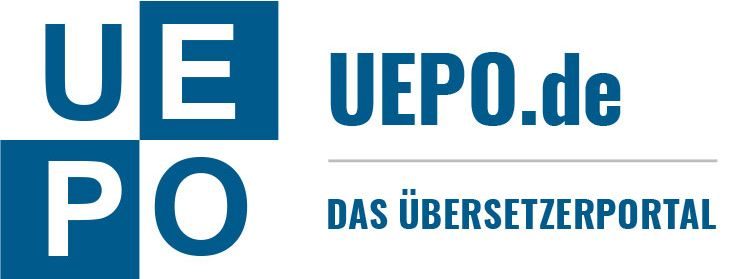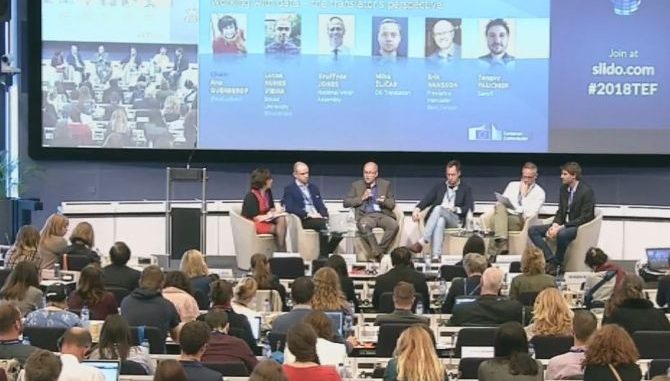
Vom 8. bis 9. November 2018 veranstaltet die Generaldirektion Übersetzung der Europäischen Union das fünfte Translating Europe Forum in Brüssel. Rund 500 Teilnehmer werden im Gebäude Charlemagne erwartet. Eingeladen wurden praktizierende Übersetzer sowie Vertreter von Sprachdienstleistern, Sprachendiensten und Hochschulen.
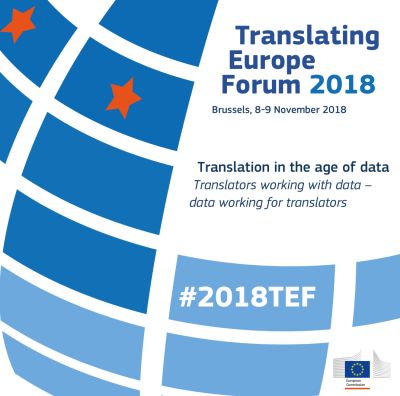 Im Mittelpunkt steht dieses Jahr das immer wichtiger werdende Thema „Daten“ in dem sich immer schneller wandelnden Arbeitsumfeld der Übersetzer. Die Vorträge, Podiumsdiskussionen und Workshops drehen sich unter anderem um folgende Fragen: Dürfen Übersetzungsdaten geteilt werden? Welche rechtlichen und praktischen Aspekte sind zu beachten? Wie können Übersetzer von den Daten profitieren, die sie selbst erzeugen? Welche Auswirkungen wird die Anwendung Künstlicher Intelligenz auf die Übersetzungsbrache und Einzelübersetzer haben? Wird die neuronale maschinelle Übersetzung den Beruf des Übersetzers verändern? Was unternimmt die EU in diesem Zusammenhang?
Im Mittelpunkt steht dieses Jahr das immer wichtiger werdende Thema „Daten“ in dem sich immer schneller wandelnden Arbeitsumfeld der Übersetzer. Die Vorträge, Podiumsdiskussionen und Workshops drehen sich unter anderem um folgende Fragen: Dürfen Übersetzungsdaten geteilt werden? Welche rechtlichen und praktischen Aspekte sind zu beachten? Wie können Übersetzer von den Daten profitieren, die sie selbst erzeugen? Welche Auswirkungen wird die Anwendung Künstlicher Intelligenz auf die Übersetzungsbrache und Einzelübersetzer haben? Wird die neuronale maschinelle Übersetzung den Beruf des Übersetzers verändern? Was unternimmt die EU in diesem Zusammenhang?
Konferenzsprache ist Englisch mit Verdolmetschung ins Französische.
Direktübertragung auf YouTube
Alle Veranstaltungen werden auf YouTube in englischer Sprache direkt übertragen. Die entsprechenden Links lauten für jeden Programmpunkt anders. Der Zugang erfolgt über die folgende Seite, auf der Sie einfach den Link „Live Streaming“ der gewünschte Einzelveranstaltung anklicken können:
Programmpunkte
Donnerstag, 08.11.2018
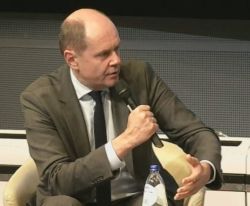
- Welcome by Rytis MARTIKONIS, Director-General of DG Translation
- AI & the language industry – challenges and impact
Keynote speech by Nozha BOUJEMAA (Research Director at Inria, the French National Institute for computer science and applied mathematics, Elected Member of the Board of Directors of the Big Data Value Association, member of Commission’s High-level group on AI.)
The role of humans in a data-driven society — what is Artificial Intelligence (AI) and how will it affect the language industry and individual translators? Clarity in terminology: ‚big data‘ vs ‚big data in translation‘. Understanding data across languages. - How is artificial intelligence transforming society and the translation industry? (Roundtable discussion)
AI can help shape business and generally make our lives easier? What innovative technologies, strategies and competencies are needed to make society benefit from AI? What about the pitfalls? What about ethics? How does AI affect translation and the future of the language industry? Is the translation industry different from other industries? The aim of this session is to paint the broader context for the rest of the Forum.
Chair: Ana GUERBEROF. Participants: Lucia SPECIA, Professor of language engineering at the University of Sheffield (natural language processing, machine learning and computational linguistics); Rose LUCKIN, Professor of Artificial Intelligence at University College London; Alison B. LOWNDES, responsible for Artificial Intelligence Developer Relations (Deep learning, AI, image recognition) at NVIDIA (AI computing). - Neural Machine Translation (NMT) reality check: the state of the art, and a taste of the future (Roundtable discussion)
This session will look at the latest developments in neural machine translation (NMT) and AI. How does NMT work and what kind of data is needed to create a fluent engine? How can these be obtained? What are the features of the current cutting-edge tools? What about integration of NMT in current CAT tools? What are the next steps? What new opportunities does this represent for people working in the language industry?
Chair: Dieter RUMMEL, DG Translation. Participants: John TINSLEY, Co-founder and CEO at Iconic Translation Machines, Ltd.; Bruno POULIQUEN, senior engineer at WIPO, responsible for NMT; Matt POST, research scientist, Johns Hopkins University. - Working with data – the translator’s perspective (Roundtable discussion)
How do practitioners deal with translation data and how can they benefit from them? How can translators best manage their data? What data are available to translators? Corpora, translation memories etc. Can freelance translators build or train their own MT engine? What training and skills are needed to work with data in translation and how does this change the traditional work of a translator? What skills for ‚data curators‘ in the translation field?
Chair: Ana GUERBEROF. Participants: Lucas NUNES VIEIRA, Lecturer in Translation Studies with Technology at Bristol University; Gruffydd JONES, Translator at the National Welsh Assembly, responsible for the introduction of MT; Miha ZLICAR, translator DG Translation; Erik HANSSON, FL translator; Tanguy FAUCHIER, internal linguist, Sanofi S.A. - Legal aspects of data in translation
This session will look at data from the legal point of view. The aim is to raise awareness of aspects such as: data and IPR (does the new GDPR play a role; how to make your translation business GDPR-compliant?), re-use of data, confidential data, MT in the cloud, data ethics (how is data generated, recorded, curated and shared).
Chair: Mikael JOHANSSON, Legal Officer DG TRANSLATION. Participants: Eva ŠKORNIČKOVÁ, Data Protection and IT Security Compliance advisor; Annette SCHILLER, FL translator + President FIT Europe; Wojciech WOȽOSZYK, lawyer, specialising in copyright of translation memories. - Translating Europe workshops – Translation and data in local markets
Throughout the year, local Translating Europe workshops are organised which yield a lot of insights in local markets, practices and opportunities. This session will showcase three workshops on data, technology and the skills to deal with them, and can serve as inspiration for further training of translators.
Chair: Paul KAYE, field officer United Kingdom, DG TRANSLATION. Katia CASTELLANI, field officer Italy; Krzysztof NALEPA, field officer Poland; Jan FABER, field officer Czech Republic. - Transcending language barriers in the digital age: the EU perspective (Roundtable discussion)
What is happening at EU level? What does the EU do to remove language barriers through technology? The role of the Connecting Europe Facility in bringing down language barriers; link with the Digital Single Market, Growth and Jobs and Education. The European Parliament’s perspective: the report on Language Equality in the Digital Age.
Chair: Rytis MARTIKONIS, Director-General, DG TRANSLATION. Participants: Jill EVANS, MEP – rapporteur on Language Equality in the Digital Age; Themis CHRISTOPHIDOU, Director-General of DG EAC; Khalil ROUHANA, Deputy Director-General of DG CONNECT.
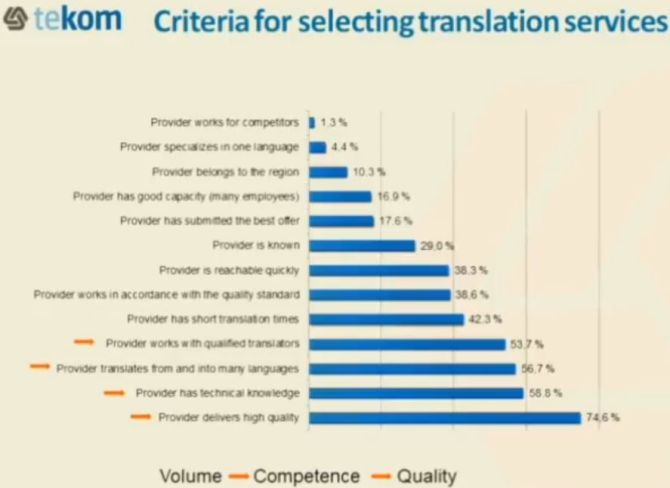
Freitag, 09.11.2018
- Reframing translation (Keynote speech)
Karim BENAMMAR, philosopher specialising in transformative thinking
Interactive session with the audience on Change Management, looking into how to deal with technology-driven change that may be disruptive. Reframing how translators see their profession and their future. - Data sharing – a data market place?
Can small language service providers (LSPs) and freelancers leverage the data they produce or is this only possible for the big players in the market? What about confidentiality and data security issues? Where do you find data and how do you decide if they are usable? How can/should small language service providers adapt their business model? Sharing of translation data – pros and cons, possible pitfalls?
Chair: Ana GUERBEROF. Participants: Jaap VAN DER MEER, TAUS; Andrea LÖSCH, European Language Resource Coordination (ELRC); Muriel MATIUSSI-KIRCHHOF, freelance translator. - Using data – making sense of industry trends
How can data collected from industry surveys benefit translators? What questions are often asked about the translation industry? What are the questions that have not yet been asked? What does data tell us and how can the industry use the data?
Co-chair: Annette SCHILLER, president FIT Europe. Co-chair: Mirko SILVESTRINI, vice-president European Union of Associations of Translation Companies. Participants: Michael FRITZ, tekom Europe; Daniela STRAUB, tekom Europe; Rudy TIRRY, President, European Union of Associations of Translation Companies. - Bringing new technologies to the classroom
Discussion on the results of EMT-LIND pilot projects using state-of-the-art terminology management tools and a look at the opportunities offered by cloud-based platforms. What new trends are there in the way we teach and work with new tools?
Chair: Jorge DIAS CINTAS, Centre for Translation Studies, UCL. Participants: Andrejs VASILJEVS Tilde; Leena SALMI, Turku University (EMT network); Marianne KALTIOKUMPU-BLOMGRÉN, student at Turku University. - Introduction of Commissioner Oettinger by Christos ELLINIDES, Deputy Director-General, DGT
- Speech by Commissioner Günther OETTINGER, Commissioner for Budget & Human Resources
- Data and translation — a pretty picture?
Informal discussion on the insights gathered from the previous sessions, kicked off by cartoons produced during the conference.
Participants: Christos ELLINIDES, Deputy Director-General DG TRANSLATION; Ana GUERBEROF, TEF moderator; Annette SCHILLER, president, FIT Europe; Karim BENAMMAR, philosopher, TEF keynote speaker.
[Text: Richard Schneider. Bild: EU, Screenshots der Direktübertragung.]
